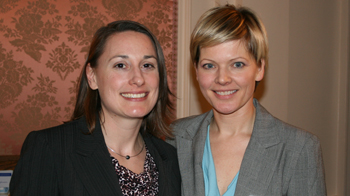Availability of Open Health Data Key to Positive Health Outcomes Nationally
Adapted from Rockefeller Institute Press Release

Erika Martin, Ph.D., M.P.H., director of Health Policy Studies at the Rockefeller Institute of Government of SUNY and assistant professor at the Rockefeller College of Public Affairs and Policy at the UAlbany; Natalie Helbig, Ph.D., M.P.A., assistant research director for CTG at one-day workshop on open health data at the Rockefeller Institute, which was co-organized with CTG in November 2013.
In a June 24th Viewpoint article for the Journal of the American Medical Association (JAMA), Erika Martin, Ph.D., M.P.H., director of Health Policy Studies at the Rockefeller Institute of Government of SUNY and assistant professor at the Rockefeller College of Public Affairs and Policy at the University at Albany; Natalie Helbig, Ph.D., M.P.A., assistant research director for the Center for Technology in Government at the University at Albany; and Nirav Shah, M.D., M.P.H., former commissioner of Health for New York State and now the senior vice president and chief operating officer at Kaiser Permanente, have called for expansion of access to governmental health data.
The article shows how people and organizations outside of state government are using New York State's Health Data NY, an innovative initiative that makes many health data sets newly accessible to the public, available in multiple non-proprietary formats, free of charge, and with unlimited use and distribution rights. The report resulted from a one-day workshop on open health data at the Rockefeller Institute, which was co-organized with the Center for Technology in Government in November 2013.
Citing the importance of President Obama's open government directive in the release of governmental data to improve transparency and enhance performance outcomes, the researchers indicate that opening governmental health data could promote efficiency, reduce costs, and save lives.
 READ FULL ARTICLE>>
READ FULL ARTICLE>>
"The implicit logic is that making governmental (health) data readily available will improve government transparency; increase opportunities for research, mobile health application development, and data-driven quality improvement; and make health-related information more accessible. Together, these activities have the potential to improve health care quality, reduce costs, facilitate population health planning and monitoring, and empower health care consumers to make better choices and live healthier lives," the researchers wrote. Although these goals are lofty, New York State has already experienced examples where releasing open health data has improved emergency response, public health policy, clinician training, patient safety, and cost accountability.
"Open data initiatives connect the information 'avalanche' with citizens' creativity and personal interests in solving public problems. New York State is a leader among states in recognizing the potential of this new direction in democratic governance. The Rockefeller Institute is privileged to work with excellent partners ---- the New York State Department of Health and the University at Albany's Center for Technology in Government ---- to help advance this innovative form of public administration. We look forward to continuing the work begun with our statewide Open Health Data: Open Opportunities workshop by means of Dr. Martin's new project on open health data for public health research, work supported by her new career development award," stated Rockefeller Institute Director Thomas Gais.
As part of Dr. Martin's two-year career development award from the Robert Wood Johnson Foundation to undertake the major research initiative entitled Testing the Usability and Fitness of Open Health Data for Studying the Relationship Between Childhood Obesity and the Built Environment, Dr. Theresa Pardo, director of CTG is Dr. Martin’s mentor, and will provide guidance on digital government research. Dr. Natalie Helbig, assistant research director at CTG will collaborate with Dr. Martin on the study.
This work was supported by grants from the New York State Health Foundation, which supported the fall 2013 workshop, and the Robert Wood Johnson Foundation's Public Health Services and Systems Research program (grant ID# 71597).